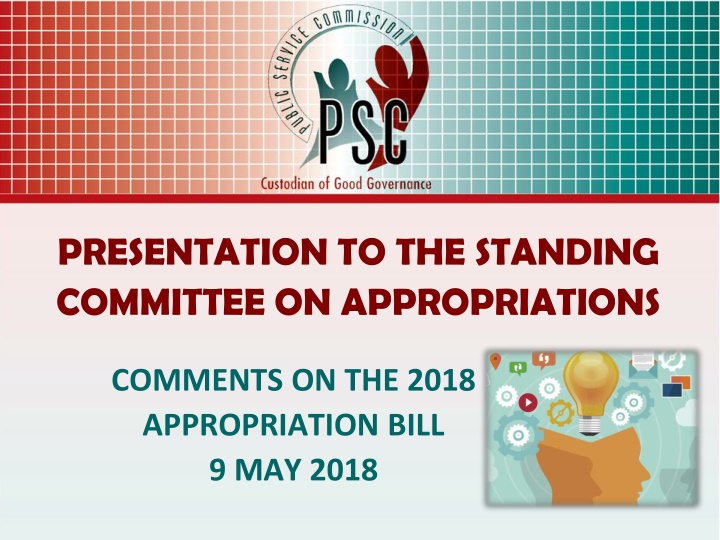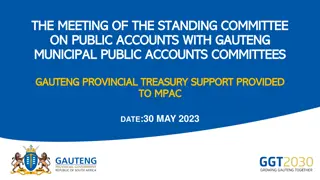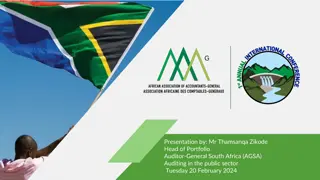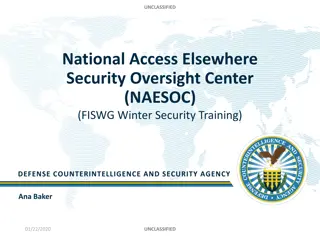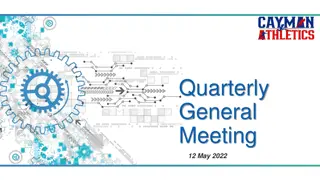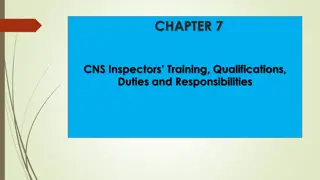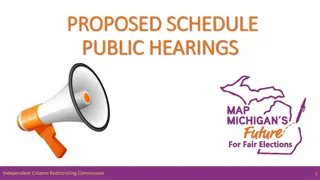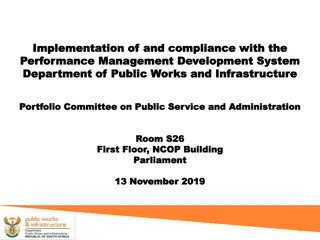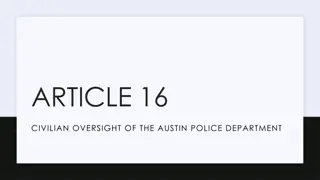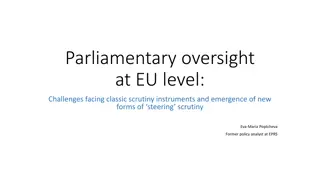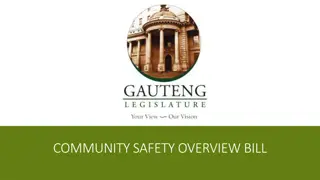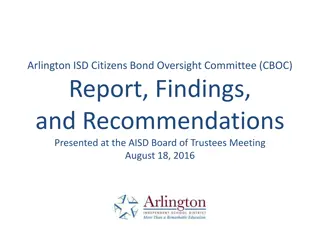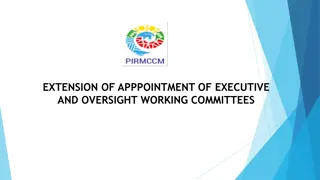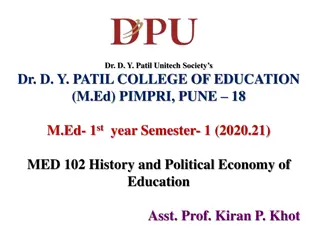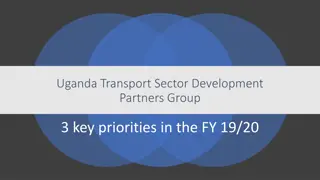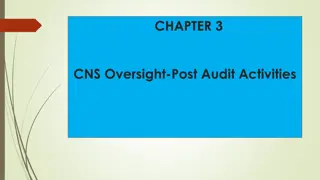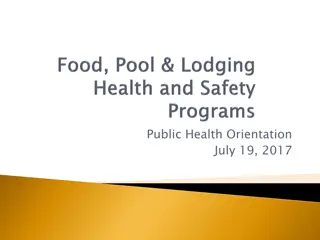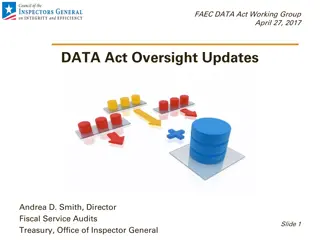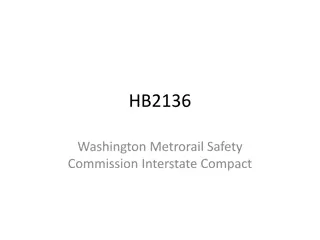Oversight and Performance Priorities of the Public Service Commission
The Public Service Commission (PSC) focuses on oversight and transformation of the Public Service, aligning with constitutional imperatives and national development goals. Their mandate includes monitoring public service organization, administration, personnel practices, and adherence to constitutional values. The PSC engages with various stakeholders to ensure efficient and effective performance within the public sector.
Download Presentation

Please find below an Image/Link to download the presentation.
The content on the website is provided AS IS for your information and personal use only. It may not be sold, licensed, or shared on other websites without obtaining consent from the author.If you encounter any issues during the download, it is possible that the publisher has removed the file from their server.
You are allowed to download the files provided on this website for personal or commercial use, subject to the condition that they are used lawfully. All files are the property of their respective owners.
The content on the website is provided AS IS for your information and personal use only. It may not be sold, licensed, or shared on other websites without obtaining consent from the author.
E N D
Presentation Transcript
PRESENTATION TO THE STANDING COMMITTEE ON APPROPRIATIONS Image result for Innovative Budget Ideas for Divisions clipart COMMENTS ON THE 2018 APPROPRIATION BILL 9 MAY 2018
OUTLINE OF THE PRESENTATION PSC Mandate Areas of Oversight Outputs of Oversight Function SCOA Requested Information Concluding Remarks Annexures A. Budget vs Performance for National Departments B. Financial Misconduct C. Performance Management D. Precautionary Suspensions E. Utilisation of Consultants 2
PSC MANDATE The Public Service Commission s priorities are based on its Constitutional imperative of oversight, which is focused on performance and transformation of the Public Service. In executing the PSC s mandate the Commission takes cognizance of the Constitution, National Development Plan (NDP), Parliamentary resolutions, Cabinet mandates and the SONA. The outcomes approach as developed by Government also provide a framework used by the PSC to assist in its prioritisation and strategic approach. In particular, the PSC contributes to Outcome 12: An efficient, effective and development- oriented Public Service . Apart from its key priorities, the PSC continues to engage with Executive Authorities, HoDs, PC on Public Service and Administration as well as Planning, Monitoring and Evaluation, and other stakeholders on its reports so as to ensure the implementation of its recommendations. 3
Related image AREAS OF OVERSIGHT (INVESTIGATION, MONITORING AND EVALUATION MANDATE) The Constitutional oversight mandate of the PSC is wide and, in summary, covers the following areas: Organisation of the public service (the structural arrangements of departments in the Public Service) Administration of the public service (all the procedures, policy frameworks, accountability mechanisms, etc. that ensure the functioning of the Public Service) Personnel practices of the public service (e.g. recruitment, transfers, promotions and dismissals) Adherence to applicable procedures in the public service (compliance with the letter and spirit of prescribed rules / policies / procedures) The extent to which the values and principles set out in section 195 of the Constitution are complied with 4 4
OUTPUTS OF OVERSIGHT FUNCTION Advise o On own accord or on receipt of any complaint, national and provincial organs of state regarding personnel practices in the public service, including those relating to the recruitment, appointment, transfer, discharge and other aspects of the careers of employees in the Public Service (S 196 (4)(f)). Recommend o Appropriate remedies regarding the resolution of grievances of employees in the public service (S 196 (4)(f)). o That executive authorities act in terms of a particular provision(s) of the Public Service Act or any other law (PS Act S 35) in resolving a particular grievance. Propose measures o To ensure effective and efficient performance within the Public Service (S 196(4)(c)). 5
OUTPUTS OF OVERSIGHT FUNCTION (2) Give directions o Aimed at ensuring that personnel procedures relating to recruitment, transfers, promotions and dismissals Related image comply with the values and principles set out in section 195 (S 196 (4)(d)). o To ensure compliance with the Public Service Act and in order to provide advice to promote sound public administration (PS Act S 5 (8)(a)). These directions are binding on executive authorities or heads of department, as the case may be, and should be implemented within 60 days (PS Act S 5 (8)(a) and (b)). 6
PRESENTATION COVERS The PSC will present on the following Discuss the 2018 Appropriation Bill with regard to the issues pertaining to the Related image mandate of the PSC. Key Indicators Monitored by the PSC. An assessment of strategies available to significantly improve administration practices in the public services especially in high education so as to ensure fee free education is effectively executed. Budgets versus performance for national departments (Annexure A). 7
PRESENTATION COVERS (2) Data used- Annual Reports (2016/17) still not available at the time of compilation Image result for not available of this presentation: Environmental Affairs PSC database, factsheets, in particular the following research reports: Analytical Brief on the Utilisation of Consultants Analytical Brief on the 30 Days Payment of Invoices Assessment of the Effectiveness of Public and Private Partnerships in the delivery of Health Services Evaluation of the role of Agencification in Public Service Delivery 8
PRESENTATION COVERS (3) Annexures to the presentation reflects information presented to the SCOA on the 8th of November 2017, currently no updated information is available on the following areas: Financial Misconduct 2017/18 financial year information will be available in November 2018 Performance vs expenditure - new information will be available from September 2018 (release of the 2017/18 Annual Reports) Precautionary suspensions - new information will be available from September 2018 (release of the 2017/18 Annual Reports) Utilisation of Consultants - new information will be available from September 2018 (release of the 2017/18 Annual Reports) 9
INTRODUCTION The PSC does not have comprehensive research on all the areas requested. The comments should therefore be viewed with this limitation in mind. Nevertheless, the PSC has built a data sourcing and analytical capability with the 9 values governing public administration as frame, and this enables the Commission to provide necessary comments. Government s spending plans aims to reignite growth and chart a course towards achieving the NDP objectives and fulfilling the constitutional obligations. The 2018 Budget directs spending to the national priorities; educating the youth, protecting the vulnerable and investing in enablers of inclusive growth. However, this presentation does not comment on this prioritisation. 10
GENERAL COMMENTS IN RELATION TO PSC MANDATE As alluded to in the Budget Speech, to create a conducive environment for public governance, its essential that the political and administrative interface challenges be addressed, as they create instability within departments. The contention between the political and administrative Heads has both policy and strategic direction implications, which in turn negatively impacts performance and service delivery. This means the ship is being steered in two different directions with huge costs implications. This disjuncture creates an breeding ground for maladministration and mismanagement of funds. Corruption undermines good governance, legitimacy and credibility of the state, sound and functional institutions as well as effective operation of government. It further hampers development efforts, economical growth and has far reaching financial implications on the available budget. 11
GENERAL COMMENTS IN RELATION TO PSC MANDATE (2) The pledge to confront allegations of state capture through the Judicial Commission of Inquiry is clearly shown. Yet, the Bill is silent on the financial considerations for the investigation agencies such as the Hawks and the Asset Forfeiture Unit (AFU). Furthermore, the Bill shows no consideration for the Anti-Corruption structures such as the National Anti-Corruption Forum led by the Minister of Public Service and Administration (MPSA) and the PSC. With the expenditure cuts it is vital that the duplication of functions between departments be addressed, with the focus on how departments can minimise the inevitable negative impact of these cuts on performance and service delivery. 12
GENERAL COMMENTS IN RELATION TO PSC MANDATE (3) Better accountability of State Owned Enterprises (SoEs) is crucial for service delivery and the broader transformation of the state. The PSC fully supports the Presidential Review Commission (PRC) that a greater degree of centralisation of the ownership function is required to ensure good governance. There is a need to rationalise the number of SoEs against their mandates to determine the validity and return of investment made by Government. Oversight departments should take their role and responsibilities seriously to ensure effective and efficient management of SoEs, as most of the entities are self-managing. The PSC is in total agreement that the bail-outs are not a solution but rather an enabler, which only causes operational inefficiencies and financial burden on the state. 13
GENERAL COMMENTS IN RELATION TO PSC MANDATE (4) It is essential that Government reviews and assesses the impact of the establishment of the agencies (agencification) and Public and Private Partnerships (PPPs): The impact on the fiscus (all related cost of agencies and partnerships). The costs of the specific PPP (e.g. Albert Luthuli) is modelled but not the financial implication for the budgets of all the other hospitals. We create a Rolls-Royce for one hospital to the detriment of all the others. Agency mandates in relation to the departments mandates: are these agencies delivering the Constitutional mandate and functions of the departments (possible duplications)? Measure the return on investment. PSC inspected various border posts, aimed to assess the service delivery and infrastructural challenges. The Department of Home Affairs presented the establishment of the Border Management Agency (BMA), as a possible solution. Parliament passed the Bill on 06 June 2017. This move has a potential pressure budget of R12 billion per year. 14
KEY INDICATORS MONITORED BY THE PSC Evidence presented focuses on: Financial Disclosure Framework Payment of Invoices Utilisation of Consultants 15
Financial Disclosure Framework The Financial Disclosure Framework (FDF) was introduced (1999) to safeguard public confidence and manage public servants conflict of interest. This Framework facilitates public scrutiny. All SMS members are required to disclose the particulars of all their registrable interests (e.g. companies and properties) to their respective Executive Authorities (EAs) by not later than 30 April each year. For 2017/18 reporting year, the compliance rate for the 2016/17 financial year is 99%. Compliance rate 100% submission 0% submission 99% 72% 0% 2017/18 99% 83% 2% 2016/17 98% 79% 2% 2015/16 74% 45% 25% 2014/15 NOTE: Years refers to the reporting year and figures/numbers reflects the previous financial year results. This means each reporting year reports on the previous financial year. 16
Non-Compliance with financial disclosure framework The number of forms received shows a 99% compliance rate. Noteworthy is the decline in the number of departments that have achieved a 100% submission rate by the end of the respective reporting financial year (31 March) from the 83% to a 72% (-11%). No. of Forms Submitted Manually No. of forms submitted via E-disclosure National Departments No. of SMS Members No. of Forms Outstanding % Received 47 6 056 349 5 657 50 99% Total of both manual submission & E-disclosure = 6 006 of the 6 056 SMS members The need for the identification of potential conflicts of interest is based on the likelihood that SMS members could use state resources to further private interests. For instance, a direct clash between private interests of an individual and official responsibilities as public servants could influence them to improperly discharge their official duties and responsibilities. 17
Payment of Invoices Procurement is central to government service delivery system and can therefore be used to achieve socio-economic objectives such as stimulating economic activity and alleviating national disparities. Government is mindful of the importance of Small Medium and Micro Enterprises (SMMEs) and the role it plays in inclusive economic growth and job creation. Cabinet has noted with concern non-compliance and its devastating impact of non- payment of suppliers within 30 days on SMMEs and its impact on service delivery. The existing institutional arrangements are: Office of Accountant General (OAG) at NT, Special Unit established within the DPME, the Office of the Chief Procurement Officer (OCPO) at NT, and Small Enterprise Development Agency (SEDA). Despite these initiatives the non-payment of suppliers remain a challenge, stifling economic growth and job creation in the SMMEs sector. 18
Payment of Invoices (2) Number invoices older than 30 days not paid for quarters 1, 2 and 3 for the 2017/18 financial year: 11081 9755 8930 Q 1 Q 2 Q 3 19
Payment of Invoices (3) Value of invoices older than 30 days not paid for quarters 1, 2 and 3 for the 2017/18 financial year: R 124bn R 42 bn R 39 bn Q 1 Q 2 Q 3 20
Payment of Invoices (4) The following departments are the main transgressors contributing significantly to the 11 081 invoices not paid by the end of Dec 2017: Departments Number of Invoices Amounts Public Works & PMTE Water and Sanitation 10 788 169 R 5m R 104m The non-payment of invoices is indicative of a much bigger problem within departments characterised by amongst others poor financial management (lack of budgets), poor contract management, lack of internal controls, and non-adherence to supply chain management processes. The PSC is in the process of summonsing the top 5 HOD/DGs of defaulting departments that have not paid invoices timeously. The culture of non-payment is further demonstrated at inter-governmental level, where departments are in debt to the Office of the State Attorney to the amount of R1.1billion.* Similarly the amount owned to municipalities by department at the end of Sept 2017 was R 7.4billion.# 21 * Report on Outstanding Litigation Claims to Debtor Departments, dated 7 February 2018 # Government Debt Owed to Municipalities, National Inter-Governmental Forum (NIGF), dated 13 April 2018
Utilisation of Consultants The use of consultants by Government was initially seen Related image as an intervention to address the skills and capacity gap and fast track the implementation of priority programmes in departments. However, this intervention has created a reliance on consultants to deliver on department s mandates. Related image The reality is that with the utilisation of consultants, the PS has not yet seen the return of investment, in terms of skills and knowledge transfer to public servants. Departments are still dealing with a lack of capacity or competencies to deliver on their mandates. 22
Utilisation of Consultants (2) Number of Consultants 2015 1984 1664 2014/15 2015/16 2016/17 Over the last 2 financial years (2015/16 and 2016/17) there has been a slight decline (1.5% reduction from the 2015/16) in the number of consultants used. However, the number of consultants should be closely monitored, as departments are becoming creative in the reporting of consultants utilised. For instance, consultants are absorbed as employees additional to the establishment to reflect a reduction in the number and costs of consultants. 23
Utilisation of Consultants (3) Costs of Consultants R 4.2bn R 3.2bn R 2.8bn 2014/15 2015/16 2016/17 A significant decline is noted in the cost of consultants, from R4.2bn in 2015/16 to R2.8bn in 2016/17. This decline could be attributed to Government s cost containment measures and also a shift in budget expenditure from consultants to compensation of employees. The shift refers to the consultants who are appointed as employees additional to the establishment. Further to this, the decline in the costs can be attributed to the reduction in consulting days. 24
Utilisation of Consultants (4) There is a noteworthy gap in the legislative framework, which provides reporting requirements and guidelines for departments, with particular Image result for gap clipart reference to the management and use of consultants. The Public Service Regulations (PSR) of 2001 defines the requirements for annual reporting for the utilisation of consultants. However, the amended 2016 PSR does not make any provision for reporting on the utilisation of consultants. The limitation is that these sections of the PFMA do not explicitly state the reporting requirements regarding the utilisation of consultants. This creates a loophole in terms of the enforceability with regard to how departments are expected to effectively and transparently report on this matter. This loophole creates a gap in the overall financial management reporting of departments to ensure that budgets are appropriately spent, which in turn can lead to mismanagement of funds. 25
STRATEGIES AVAILABLE TO SIGNIFICANTLY IMPROVE ADMINISTRATION PRACTICE IN THE PUBLIC SERVICE Planning and Reporting Budgeting and costing should become an integral part of the departmental planning and reporting, for both the Medium Term Strategic Framework (MTSF) and annual performance plans (APPs) cycles. All policies and integrated plans should be costed for, not just focused on annual implementation costs but the projected costs for the MTSF cycle. For instance, the planned Joint Health Action Plan (per the Budget Speech) should provide a clear indication of the budget contributions from the National Department of Health and National Treasury including at provincial level. Annual reporting requirements should include narrative sections for departments to report on spending priorities for period of review and in particular account for expenditure of above 90% when less then 60% of the pre-determined targets are achieved. Budget-based planning and costing implementation could address the constant requests for additional funds by departments through the adjusted estimated national expenditure (AENE). 26
STRATEGIES AVAILABLE TO SIGNIFICANTLY IMPROVE ADMINISTRATION PRACTICE IN THE PUBLIC SERVICE (2) Human Management: Organisational Design a review of all departmental organisational structures/establishments should be undertaken. This review should focus on dealing with duplication of functions within and across departments, and the appointments against an unapproved organisational structure (unapproved organogram). The reality is that the compensation budget of departments are allocated based on the approved organisational structure. This gap creates an opportunity for irregular appointments and unnecessary increase to the compensation budget. 27
STRATEGIES AVAILABLE TO SIGNIFICANTLY IMPROVE ADMINISTRATION PRACTICE IN THE PUBLIC SERVICE (3) Financial Sector Transformation: Capacitating the departments based on the Auditor General findings over the last 3 to 4 financial years it is clear that department do not have the required financial management capacity. It is essential that a skills audit be conducted in the departments to inform the development of a training programme to be led by the National School of Government (NSG). This undertaking will have costs implications and should be jointly led by the Department of Public Service and Administration (DPSA) and the NSG. Training programme should include the executive authorities, accounting officers and SMS members, starting with financial officials and responsibility managers. Financial Misconduct - a clear directive should be provided to all departments by the NT pertaining to actions to be taken by department for officials responsible for the non-payment of service provider within the stipulated timeframe (cases base on merit not blanket approach). 28
STRATEGIES AVAILABLE TO SIGNIFICANTLY IMPROVE ADMINISTRATION PRACTICE IN THE PUBLIC SERVICE (5) Fee Free Education The ring-fencing of budget to deal with the fee-free higher education is a positive response to effectively and efficiently deal with this matter. However, it can be seen as a potential risk, which should be monitored by the Committee in terms of the long-term sustainability of the budget cuts (across departments) vis- -vis service delivery and performance, including the provisions for Basic Education. Furthermore, the ring-fenced budget should be translated into a detailed and costed phased-in policy, to ensure close monitoring and management of implementation, with clear costing drivers. For instance, understanding the demand vs the supply number of students that need assistance vs student that can be assisted. 29
CONCLUDING REMARKS A fine balancing act will be required to manage performance and service delivery, against the expenditure cuts at all spheres of government and the 2016 compensation ceiling arrangement of R15bn to be cut in 2018/19. Cuts in the national government expenditure, where impact will mostly be felt by large programmes and transfers to public entities will definitely mean initiative financial planning and management. The issue of duplication of functions between departments is critical in the current budgeting cutting environment. This starts with addressing the organisational design of departments with specific focus on the funded vs unfunded posts, appointments against unapproved organisation structures and duplication of functions across government. 30
Annexures 31
Annexure A Budget vs Performance of National Departments 32
Performance vs. Expenditure Ten lowest performing departments for the 2016/17 FY, in respect of the achievement of planned targets (detailed information Appendix A to the presentation): 66.7% 65.9% 60.9% 58.6% 56.3% 52.6% 51.3% 41.6% 34.1% 31.4% 33
Performance vs. Expenditure (2) Departments that underspent below the norm of 98%: 98% 97.9% 97.1% 97.4% 97.9% 97.9% 95.6% 95.8% 97.1% 97.5% 94.7% 95.5% 89.9% 84.4% 73.4% 34
Performance vs. Expenditure (3) With the name changes, mergers, discontinuation and introduction of new programmes it is difficult to establish a trend in the performance of the national departments. Of the 47 departments, 16 (34%) have made changes to programmes over the last 3 FYs. Nevertheless, there were noteworthy declines detected in the overall performance of the following departments for 2016/17: 2014/2015 2015/16 2016/17 Basic Education 83.9% 73.3% 68.2% Energy 28.6% 49.3% 41.6% Health Human Settlements 63.5% 72.6% 59.5% 76.7% 58.6% 52.6% IPID Office of the Chief Justice Public Works 86.7% 76.3% 77.1% 63.2% 34.1% 66.7% 56.3% New Dept 45.5% Women 36.4% 47.1% 31.4% The 16 depts. are Arts and Culture, Civilian Secretariat, Comms and GCIS, Cooperative Governance and Traditional Affairs, Economic Dev, Energy, Higher Education, Human Settlement, IPID, Sport and Recreation, The Presidency, Trade and Industry, Water and Sanitation, and Women. 35
Performance vs Expenditure (1) 2014/15 2015/16 2016/17 DEPARTMENT PROGRAMME(S) % Achieved % Spend % Achieved % Spend % Achieved % Spend 73.3% 100.0% 50.0% 81.8% 80.0% 87.5% 80.0% 53.6% 80.8% 80.0% 97.3% 99.6% 98.0% 99.9% 100.0% 100.0% 99.1% 95.1% 96.3% 99.7% 85.7% 88.9% 75.0% 92.9% 77.8% 50.0% 81.2% 44.4% 65.0% 86.1% 99.6% 100.0% 99.8% 99.8% 99.9% 100.0% 99.9% 91.2% 103.4%Programmes changed in 2016/17 97.3% Cultural Dev merged with Prog 3 Arts Culture 73.7% 77.8% 71.4% 93.8% 91.7% 72.7% 98.2% 100.0% 99.9% 99.9% 99.4% 100.0% 99.6% 92.5% Agriculture, Forestry and Fisheries Prog 1 Administration Prog 2 Agricultural Production, Health & Food Safety Prog 3 Food Security & Agrarian Reform Prog 4 Economic Development, Trade & Marketing Prog 5 Forestry and Natural Resource Mnagement Prog 6 Fisheries Management 81.1% Totals Prog 1 Administration Prog 2 Performing Arts Prog 3 National Language Services 60% Arts and culture Cultural Dev merged with Prog 3 Arts Culture Promo Cultural Dev merged with Prog 3 Arts Culture Prog 4 Cultural Development Promo Promo National Archives with Heritage Promo 2015/16 and Discontinued 2016/17 National Archives m merged with Prog 4 Heritage Promo 83% Prog 5 Heritage Promotion 64.0% 97.6% 61.5% 99.1% National Archives merged with Prog 4 Heritage Promo National Archives merged with Prog 4 Heritage Promo Prog 6 National Archives and Libraries Prog 2 Institutional Governance - introduced 2016/17 Prog 3 Arts and Culture Promotion and Development - introduced 2016/17 Prog 4 Heritage Promotion and Preservation - introduced 2016/17 80.2% New programmmes introduced 2016/17 New programmmes introduced 2016/17 88% 97.6% 63% 75.0% 66.7% 81.3% 99.5% 97.4% 99.8% 97.3% 69.7% 100.0% 60.0% 97.9% 99.3% 92.2% 68.0% 100.0% 62.5% 98.3% 99.9% 97.8% Totals Prog 1 Administration Prog 2 Curriculum Policy, Support & Monitoring Prog 3 Teacher Education HR and Institutional Development Prog 4 Planning Information & Assessment Prog 5 Education Enrichment Services Basic Education 100.0% 78.6% 100.0% 83.9% 100.5% 100.0% 99.6% 99.2% 57.0% 88.9% 50.0% 73.3% 90% and above 99.9% 96.3% 99.9% 97.7% 75.0% 38.5% 100.0% 68.2% 99.9% 93.1 99.9% 95.8% 36 Totals 0% - 60% 61% - 89%
Performance vs Expenditure (2) 2014/15 2015/16 2016/17 DEPARTMENT PROGRAMME(S) % Achieved % Spend % Achieved % Spend % Achieved % Spend 100.0% 98.8% 54.1% 99.3% 93.3% 94.4% Civilian Secretariat for Police Prog 1 Administration Prog 2 Partnerships Prog 3 Policy and Research Prog 4 Legislation Prog 5 Monitoring and Evaluation Prog 2 Intersectoral Coordination and Strategic Partnership Prog 3 Legislation and Policy Development Prog 4 Civilian Oversight, Monitoring and Evaluation New programmes introduced from 2014/15 (below) New programmes introduced from 2014/15 (below) New programmes introduced from 2014/15 (below) 16.7% 92.5% 92.3% 66.7% 100.0% 72.7% 55.6% 50.0% 99.4% 99.9% 0.0% 84.4% 66.7% 85.7% 79.6% 91.9% 31.3% 48.5% 96.0% 98.9% 92.3% 65.9% 88.9% 83.8% 89.9% 99.2% Totals Communications Prog 1 Administration Prog 2 International Affairs Prog 3 ICT Policy, Research & Capacity Development Dept was separated from GCIS. Programmes were replaced with new programmes in 2016/17 Department changed to GCIS Department changed to GCIS Prog 4 Broadcasting & Communications Regulation & Support Prog 5 ICT Infrastructure Support Prog 2 Communication Policy, Research and Development - 2016/17 Prog 3 Industry and Capacity Development - 2016/17 20.0% 88.3% New programmes introduced 2016/17 New programmes introduced 2016/17 100.0% 73.6% Prog 4 Entity Oversight - 2016/17 60.0% 100.0% 75.0% 99.0% Totals Government Communication and Information System Prog 1 Administration 85.7% 100.00% 100.0% 100.4% 100.0% 98.64% Prog 2 Content Processing annd Dissemination 92.9% 98.38% 95.2% 98.7% 92.3% 100.0% 99.85% 97.13% Prog 3 Intergovernmental Coordination and Stakeholder Management Prog 4 Communication Service Agency 81.3% 100.00% 100.0% 100.0% 100.00% Programme info not included in the 2016/17 AR 96.4% 100.0% 98.5% 100.0% 99.9% 88% 99.6% 98.7% Totals 37 0% - 60% 61% - 89% 90% and above
Performance vs Expenditure (3) 2014/15 2015/16 2016/17 DEPARTMENT PROGRAMME(S) % Achieved % Spend % Achieved % Spend % Achieved % Spend Cooperative Governance Prog 1 Administration 98.51% 25% 99.40% No PIs 50.0% 99.8% Prog 2 Policy, Research & Knowledge Management 60% 93.00% 100.0% 91.2% Prog 3 Governance & Intergovernmental Relations 73% 100% 77% 57% 95.50% 44.00% 89.00% 99.90% Separation of Cooperative Governance and Traditional Affairs - new programmes introduced 2016/17 100.0% 100.0% 100.0% 93.5% 46.4% 100.0% Prog 4 Disaster Response Management Prog 5 Prov & Mun Gov Systems Prog 6 Infrastructure & Economic Development 100.0% 96.4% Prog 7 Traditional Affairs No PIs Traditional Affairs separate AR for 2015/16 100.0% Prog. 2 Regional and Urban Development and Legislation Support Prog. 3 Institutional Development 0.0% 89.81% New programmes introduced 2016/17 after separation for Cooperative Governance and Traditional Affairs New programmes introduced 2016/17 after separation for Cooperative Governance and Traditional Affairs 100.0% 97.14% Prog. 4 National Disaster Management Centre 100.0% 49.92% Prog. 5 Local Government Support and Interventions Management Prog. 6 Community Work Programme 100.0% 87.29% 100.0% 90.5% 74.30% 95.6% 95.7% 93.7% 67.30% 96.16% Totals Correctional Services Prog 1 Administration Prog 2 Incarceration Prog 3 Rehabilitation 36.4% 63.6% 100.0% 99.4% 99.3% 91.9% 42.9% 37.5% 77.8% 100.0% 100.0% 100.0% 100.0% 99.7% 99.8% 61.5% 62.5% 77.8% Prog 4 Care 80.0% 100.0% 60.0% 100.0% 100.0% 50.0% Prog 5 Social Reintegration 85.7% 68.3% 76.9% 64.3% 66.7% 0.0% 100.0% 100.0% 100.0% 50.0% 73.5% 100.0% 99.0% 100.0% 100.0% 99.9% 100.0% 100.0% 100.0% 100.0% 100.0% 100.0% 71.4% 55.8% 57.8% 64.7% 66.7% 33.3% 33.3% 33.3% 40.0% 50.0% 100.0% 100.0% 99.9% 99.6% 100.0% 100.0% 100.0% 100.0% 100.0% 100.0% 100.0% 99.8% 100.0% 99.6% 100.0% 100.0% 99.4% 100.0% 100.0% 100.0% 99.9% 83.3% 67.5% 55.7% 61.5% 66.7% 66.7% 33.3% 16.7% 50.0% 50.0% 53.3% Totals Defence Prog 1 Administration Prog 2 Force Employment Prog3 Landward Defence Prog 4 Air Defence Prog5 Maritime Defence Prog 6 Military Health Support Prog 7 Defence Intelligence Prog 8 General Support 38 0% - 60% 61% - 89% Totals 90% and above 54.8% 100.0%
Performance vs Expenditure (4) 2014/15 2015/16 2016/17 DEPARTMENT PROGRAMME(S) % Achieved % Spend % Achieved % Spend % Achieved % Spend Economic Dev Prog 1 Administration No PIs 99.3% 100.0% 99.9% 100.0% 97.8% Prog 2 Economic Development - Changed to Growth Path and Social Dialogue (2015/16) 100.0% 99.5% 100.0% 95.8% 81.3% 93.0% Prog 3 Economic Planning & Coordin - Changed to Investment Competition and Trade (2015/16) 100.0% 99.8% 100.0% 99.9% 90.5% 99.0% Prog Merged with Prog 2 Prog 4 Econ Dev & Social Dialogue 100.0% 98.1% Prog Merged with Prog 2 Totals 100.0% 99.7% 100.0% 100.0% 87.8% 98.6% Energy Prog 1 Administration 57.1% 98.7% 53.8% 100.0% 54.5% 114.5% Prog 2 Energy Policy and Planning 25.0% 78.7% 30% 93.9% 0.0% 99.3% Prog 3 Energy Regulations - 2016/17 name changed to Petroleum and Petroleum Prouducts Regulation 20.0% 82.5% 75% 99.9% 80.0% 100.0% Prog 4.Nuclear Energy Regulation - 2016/17 name changed to Electricification and Energy Programme and Project Management 33.3% 99.9% 64.2% 99.9% 72.2% 99.4% Prog 5 Clean Energy - 2016/17 Pragramme name changed to Nuclear Energy 0.0% 41.9% 53.3% 100.0% 40.0% 99.2% Prog 6 Energy Programmes and Projects - 2016/17 name changed to Clean Energy 20.0% 99.1% 42.8% 70.3% 33.3% 94.9% Totals 28.6% 83.6% 49.3% 98.3% 41.6% 99.5% 39 0% - 60% 61% - 89% 90% and above
Performance vs Expenditure (5) 2014/15 2015/16 2016/17 DEPARTMENT PROGRAMME(S) % Achieved % Spend 100.0% 98.5% 100.0% 100.0% 100.0% 99.9% 100.0% 99.9% 97.2% % Achieved % Spend % Achieved % Spend Environmental Affairs Prog 1 Administration Prog 2 Legal, Authorisations & Compliance Prog 3 Oceans & Coasts Prog 4 Climate Change & Air Quality Prog 5 Biodiversity & Conservation Prog6 Environmental Programmes Prog 7 Chemicals & Waste Management 98.1% 100.0% 100.0% 100.0% 100.0% 100.0% 100.0% 99.4% 80.0% 87.0% 75.0% 95.5% 77.8% 75.0% 72.7% 72.7% 82.0% 81.8% 100.0% 99.8% 99.1% 100.0% 99.9% 100.0% 100.0% 99.9% 98.9% Annual Report Not Available Totals Health Prog 1 Administration Prog 2 National Health Insurance, Health Planning and System Enablement Prog 3 HIV & AIDS, TB & Martenal, Child & Women's Health 75% 98.7% 73.7% 48.4% 65.6% 90.5% 73.3% 98.3% 48.4% 99.9% 56.1% 99.0% 54.2% 99.7% Prog 4 Primary Health Care Services Prog 5 Hospitals, Tertiary Services & Human Resource Development. Prog 6 Health Regulation and Compliance Management 72.0% 95.5% 73.1% 98.8% 78.3% 94.8% 57.1% 98.3% 37.9% 100.0% 32.1% 99.9% 58.3% 63.5% 0.0% 94.7% 97.8% 99.9% 61.1% 59.5% 50.0% 99.9% 99.4% 97.7% 50% 58.6% 60% 99.9% 99.7% 98.2% Totals Higher Education Prog 1 Administration Prog 2 Human Resource Development, Planning and Monitoring Coordination 66.7% 98.2% 50.0% 94.2% 100% 79.4% Prog 3 University Education Prog 4 Vocatonal and Continuing Education and Training Prog 5 Skills Development 73.1% 100.0% 75.0% 99.9% 63% 100.0% 20.0% 100.0% 100.0% 100.0% 75.0% 37.5% 99.2% 99.5% 67% 100% 100.0% 99.6% Prog 6 Community Education and Training - introduced 2016/17 New Prog introduced 2016/17 65.1% New Pro introduced 2016/17 64.0% 75% 76.3% 99.5% 99.9% 40 Totals 100.0% 99.8% 0% - 60% 61% - 89% 90% and above
Performance vs Expenditure (6) 2014/15 2015/16 2016/17 DEPARTMENT PROGRAMME(S) % Achieved % Spend % Achieved % Spend % Achieved % Spend 86.1% 42.9% 66.7% 76.9% 86.7% 100.0% 100.0% 100.0% 100.0% 98.4% 94.7% 80.0% 58.3% 80.6% 76.4% 99.91% 99.96% 99.77% 99.9% 94.4% 91.3% 80.0% 75.0% 86.1% 62.5% 99.5% 99.9% 99.9% 99.8% 92.4% Home Affairs Prog 1 Administration Prog 2 Citizen Affairs Prog 3 Immigration Affairs Totals Human Settlement Prog 1 Administration Prog 2 Human Settlement Policy, Strategy and Planning 58.0% 75.0% 98.3% 70.5% 83.8% 56.2% 97.0% 72.4% 58.3% 43.5% 93.8% 69.7% Prog 3 Programme Delivery Support Prog 4 Housing Development Finance 72.2% 100.0% 88.8% 98.5% 50.0% 100.0% Prog 5 Chief Financial Officer Prog 6 Office of the Chief Operations Officer Programmes moved under Prog 1 Admin Programmes moved under Prog 1 Admin Programmes moved under Prog 1 Amin 72.6% 99.8% 76.70% 98.30% 52.6% 99.6% Totals Independent Police Investigative Police Directorate Prog 1 Administration 75.0% 99.9% 72.7% 99.48% 42.9% 99.80% Prog 2 Investigation and Information Management 87.5% 100.0% 95.7% 99.88% 15.8% 99.89% Prog 3 Legal Services 90.0% 61.0% 30.8% 99.50% 66.7% 99.00% Prog 4 Compliance Monitoring and Stakeholder Management Prog 1: Governance & Stakeholder Management 100.0% Programmes Discontinued 95.8% 91.7% 99.16% 33.3% 99.95% Programmes Discontinued Programmes Discontinued Prog 2 Corporate Services 86.7% 63.6% 99.0% 92.7% 76.27% 25.0% 99.73% 100.0% 34.1% 75.8% 99.8% 99.6% Totals Prog 1 Administration International Relations and Cooperation Prog 2 International Relations Prog 3 International Cooperation Prog 4 Diplomacy and Protocol Services 33.3% 91.4% 95.8% 99.9% 100.0% 96.3% 0.0% 80.0% 92.0% 103.8% 99.6% 91.7% 68.8% 79.7% 100.0% 100.0% 96.1% 99.7% Prog 5 International Transfers 0.0% 100.0% 0.0% 104.4% No PIs 104.3% Totals 81.1% 98.2% 64.0% 102.1% 80.9% 100.1% 41 0% - 60% 61% - 89% 90% and above
Performance vs Expenditure (7) 2014/15 2015/16 2016/17 DEPARTMENT PROGRAMME(S) % Achieved % Spend % Achieved % Spend % Achieved % Spend Justice and Constitutional Development Prog 1 Administration 90.0% 99.2% 64.3% 99.3% 80% 99.9% Prog 2 Court Services 92.3% 98.2% 76.5% 100.0% 93% 100.0% Prog 3 State Legal Services 84.6% 100.0% 81.8% 98.4% 79% 100.0% Prog 4 National Prosecuting Authority 75.9% 100.0% 64.3% 100.0% 100% 100.0% Prog 5 Auxiliary and Associated Services 100.0% 95.5% 33.3% 99.7% 100% 100.0% Totals 84.8% 44.4% 42.9% 44.4% 98.3% 88.4% 99.6% 96.6% 71.6% 44.4% 64.7% 44.4% 99.7% 91.6% 100.0% 97.5% 85.5% 42.9% 81.3% 75.0% 100.0% 96.7% 92.8% 99.8% Labour Prog 1 Administration Prog 2 Inspection & Enforcement Services Prog 3 Public Employment Services Prog 4 Labour Policy & Industrial Relations 66.7% 97.7% 71.4% 98.7% 58.3% 98.3% Totals 50.0% 71.4% 20.0% 95.0% 90.2% 96.1% 56.9% 58.3% 60% 96.6% 90.50% 96.10% 67.4% 66.7% 60.0% 97.1% 99.2% 77.7% Military Veterens Prog 1 Administration Prog 2 Socio Economic Support Services Prog 3 Empowerment and Stakeholder Management 40% 80.40% 33.3% 80.0% 50.0% 82.7% Totals 52.0% 93.3% 95.5% 100.0% 91.7% 99.9% 100.0% 100.0% 54.5% 73.7% 80.0% 90.5% 91.8% 100.0% 100.0% 100.0% 60.9% 92.9% 75.0% 72.7% 84.4% 99.5% 99.5% 99.5% Mineral Resources Prog 1 Administration Prog 2 Promotion of Mine Safety & Health Prog 3 Mineral Regulation Prog 4 Mineral Policy & Promotion 95.2% 100.0% 88.0% 100.0% 84.2% 99.5% Totals 95.7% 100.0% 81.7% 100.0% 80.0% 99.5% 42 0% - 60% 61% - 89% 90% and above
Performance vs Expenditure (8) 2014/15 2015/16 2016/17 DEPARTMENT PROGRAMME(S) % Achieved % Spend % Achieved % Spend % Achieved % Spend National School of Governance Prog 1 Administration Prog 2 Public Sector Organisational and Staff Development 63.0% 94.4% 72.5% 100.0% 81.8% 99.00% 59.5% 100.0% 68.8% 100.0% 71.4% 100.80% Totals 61.4% 75.0% 96.7% 97.4% 71.1% 75.0% 100.0% 97.1% 76.0% 85.7% 100.3% 93.9% National Treasury Prog 1 Administration Prog 2 Economic Policy, Tax, Fin Reg & Research 100.0% 78.4% 61.1% 39.5% 50.0% 92.5% 94.4% 92.4% 95.0% 99.9% 80.0% 76.5% 91.3% 53.0% 81.5% 98.9% 97.7% 100.0% 98.8% 100.0% 81.3% 88.2% 85.0% 70.5% 50.0% 96.6% 95.7% 97.4% 96.7% 99.9% Prog 3 Pub Fin & Budget Management Prog 4 Asset & Liability Management Prog 5 Financial Systems & Accounting Prog 6 International Financial Relations Prog 7 Civil & Military Pensions, Contributions to Funds & Other Benefits Prog 8 Technical Support & Development Finance 60.0% 100.0% 62.5% 100.0% 50.0% 98.6% 63.6% 93.7% 78.6% 89.7% 66.7% 95.7% Prog 9 Revenue Administration 100.0% 100.0% 100.0% Prog 10 Financial Intelligence and State Security No PIs 100.0% 98.0% No PIs 71.7% 100.0% 98.9% No PIs 76.5% 100.0% 99.0% 64.3% Totals Prog 1: Admistration 71.4% 90.8% 75% 97.82% Office of the Chief Justice Prog 2: Judicial Support & Court Admistration New Department 83.3% 99.5% 40% 98.02% Prog 3: Judicial Education & Research 66.7% 77.1% 90.1% 97.9% 100% 66.7% 95.74% 97.9% Totals Office of the Public Service Commission Programme 1: Administration 71% 99.80% 80.0% 99.80% 84.8% 100.0% Programme 2: Leadership & Management Practices 93% 82% 99.98% 99.99% 87.5% 85.7% 99.62% 99.92% 100.0% 92.3% 99.8% 99.7% Programme 3: Monitoring & Evaluation Programme 4: Integrity & Anti-Corruption 73% 77.9% 100.00% 99.9% 100.0% 84.5% 100.87% 100.01% 90.0% 89.6% 100.0% 99.9% 43 0% - 60% 61% - 89% 90% and above
Performance vs Expenditure (9) 2014/15 2015/16 2016/17 DEPARTMENT PROGRAMME(S) % Achieved % Spend % Achieved % Spend % Achieved % Spend Planning, Monitoring and Evaluation Prog 1 Administration Prog 2 Outcomes Monitoring and Evaluation Prog 3 Institutional Performance Monitoring and Evaluation Prog 4 National Planning 68.8% 57.9% 99.2% 94.0% 64.7% 63.2% 100.0% 99.4% 78.6% 78.9% 94.3% 96.3% 85.0% 98.2% 73.7% 100.0% 85.7% 99.2% 36.4% 80.2% 66.7% 93.5% 88.9% 95.4% Prog 5 National Youth Development Programme Prog 3 Monitoring & Evaluation Coordination & Support - changed after 2012/13 0.0% 100.0% 100.0% 100.0% 100.0% 99.9% Programme changed after 2012/13 Programmes changed after 2012/13 Programmes changed after 2012/13 Prog 4 Public Sector Oversight- changed after 2012/13 Totals 60.6% 96.6% 68.2% 99.3% 83.1% 97.9% Police Prog 1 Administration 66.7% 100.0% 83.8% 100.0% 69.2% 100.0% Prog 2 Visible Policing 80.0% 102.7% 60.9% 100.0% 68.6% 100.0% Prog 3 Detective Services 60.0% 100.0% 60.7% 100.0% 79.4% 100.0% Prog 4 Crime Intelligence 100.0% 100.0% 100.0% 100.0% 75.0% 100.0% Prog 5 Protection & Security 66.7% 100.0% 100.0% 100.0% 100.0% 100.0% Totals 71.1% 101.4% 75.2% 100.0% 74.5% 100.0% Public Enterprises Prog 1 Administration 50.0% 98.7% 64.7% 92.8% 100.0% 90.0% Prog 2 Legal and Governance 66.7% 90.0% 25.0% 83.6% 100.0% 83.9% Prog 3 Portf Man & Strategic Partnerships 88.2% 88.9% 68.8% 65.2% 93.5% 92.4% 81.0% 84.6% 99.9% 99.8% Totals 81.8% 94.7% 44 0% - 60% 61% - 89% 90% and above
Performance vs Expenditure (10) 2014/15 2015/16 2016/17 DEPARTMENT PROGRAMME(S) % Achieved % Spend % Achieved % Spend % Achieved % Spend Prog 1 Administration 92.9% 91.1% 100.0% 91.1% 100.0% 98.8% Public Service and Administration Prog 2 Human Resource Management & Development 60.0% 99.9% 85.7% 99.9% 100.0% 95.8% Prog 3 Labour Relations and Remuneration Management Prog 4 Public Sector Information Communication Technology Management Prog 5 Service Delivery and Organisational Transformation Prog 6 Governance and International Relations 100.0% 70.0% 100.0% 70.0% 55.6% 90.5% 100.0% 52.8% 100.0% 52.8% 75.0% 91.7% 100.0% 88.9% 92.9% 78.1% 98.2% 97.5% 93.0% 99.6% 100.0% 100.0% 98% 86.7% 98.2% 97.5% 93% 99.8% 100.0% 100.0% 89.4% 62.5% 98.6% 99.2% 97.9% 87.3% Totals Prog 1 Administration Prog 2 Immovable Asset Investment Management Programme: changed to Immovable Asset Management in 2013/14 & 2014/15 Prog 3 Expanded Public Works Programme: changed to Expanded Public in 2014/15 Prog 4 Construction and Property Policy Regulation: changed to Property and Construction Industry Policy Regulation in 2013/14 & 2014/15 Prog 5 Auxiliary and Associated Services Public Works 23.5% 97.5% 100.0% 97.2% 75.0% 57.5% 66.7% 98.9% 75.0% 99.3% 80.0% 99.2% 33.3% 100.0% 45.5% 16.7% 75.0% 53.8% 100.0% 30.0% 52.4% 88.2% 64.3% 91.3% 100.0% 98.4% 99.8% 99.7% 97.3% 100.0% 99.8% 99.4% 98.1% 92.8% 0.0% 50.0% 63.16% 30.0% 53.8% 78.6% 80.0% 37.5% 53.4% 94.7% 77.8% 99.8% 91.5% 99.51% 99.7% 97.2% 99.5% 98.3% 100.0% 99.1% 100.0% 100.0% 0.0% 25.0% 56.3% 50.0% 60.0% 85.7% 66.7% 81.8% 75.0% 86.7% 90.9% 99.8% 92.0% 98.3% 99.1% 98.8% 99.0% 99.9% 99.5% 99.4% 93.4% 98.9% Totals Rural Development & Land Reform Prog 1 Administration Prog 2 Geospatial & Cadastral Services Prog 3 Rural Development Programme 4 Restitution Programme 5 Land Reform Totals Science & Technology Prog 1 Administration Prog 2 Technology Innovation Prog 3 International Cooperation and Resources 100.0% 76.9% 100.0% 84.6% 100.0% 100.0% 100.2% 98.8% 100.0% 66.7% 81.8% 84.0% 100.0% 100.0% 88.5% 97.3% 100.0% 81.8% 86.7% 88.7% 97.7% 99.9% 99.9% Prog 4 Research Development and Support Prog 5 Socio Economic Innovation Partnerships 45 99.4% Totals 0% - 60% 61% - 89% 90% and above
Performance vs Expenditure (11) 2014/15 2015/16 2016/17 DEPARTMENT PROGRAMME(S) % Achieved % Spend % Achieved % Spend % Achieved % Spend Small Business Development Prog 1 Administration 77.7% 82.10% 78.6% 54.5% 89.1% 53.6% Department proclaimed 07 July 2014 Prog 2 Cooperatives Developments Prog 3 Enterprise Development & Entrepreneurship 50% 43.7% 95.50% 98.60% 66.7% 67.6% 52.9% 91.8% 90.8% 99.9% 54.8% 97.5% Social Development Prog 1 Administration 67.8% 99.8% 46.5% 100.0% Prog 2 Social Assistance 100.0% 99.6% 62.5% 99.4% 50.0% 98.8% Prog 3 Social Security Policy & Admin 100.0% 100.0% 33.3% 100.0% 83.3% 99.9% Prog 4 Welfare Serv Policy Dev & Implem Support Prog 5 Social Policy & Integrated Serv Del 92.9% 99.2% 67.2% 72.1% 66.7% 66.7% 95.5% 99.9% 99.4% 98.7% 65.3% 85.7% 66.1% 75.0% 99.7% 99.9% 98.90% 99.9% 78.4% 83.2% 75% 99.6% 99.6% 99.6% Totals Sport and Recreation Prog 1 Administration Prog 2 Sport & Recr Service Providers Prog 3 Mass Participation Prog 4 International Liaison and Events Prog 5 Facilities Coordination Prog 2 Active Nation Prog 3 Winning Nation Prog 4 Sport Support Prog 5 Infrastructure Support Sub programmes discontinued from 2014/15 Sub programmes discontinued from 2014/15 Sub programmes discontinued from 2014/15 100.0% 100.0% 100.0% 50.0% 91.3% 0.0% 25.0% 21.4% 0.0% 50.0% 24.1% 100.0% 98.4% 100.0% 85.6% 99.7% 95.4% 99.5% 70.2% 99.9% 99.1% 97.5% 60.0% 85.7% 100.0% 100.0% 79.4% 50.0% 50.0% 77.3% 37.5% 80.0% 65.9% 100.0% 98.9% 99.9% 95.0% 99.9% 99.5% 95.9% 76.2% 99.7% 85.9% 92.5% 80.0% 85.7% 80.0% 100.0% 71.4% 50% 86% 83% 100% 50% 76.2% 99.9% 99.3% 99.9% 89.5% 99.7% 97.4% 96.9% 88.4% 99.5% 37.4% 73.4% Totals Telecommunications and Postal Services Prog 1 Administration Prog 2 ICT International Prog 3 ICT Policy and Research Prog 4 ICT Enterprise Dev and SOE Oversight Prog 5 ICT Infrastructure Development Totals 46 0% - 60% 61% - 89% 90% and above
Performance vs Expenditure (12) 2014/15 2015/16 2016/17 DEPARTMENT PROGRAMME(S) % Achieved % Spend % Achieved % Spend % Achieved % Spend 60.0% 90.7% 84.0% 94.1% 86% 94.8% Stats SA Prog 1 Administration Prog 2 Economic Statistics 100.0% 16.7% 100.0% 100.0% 98.0% 90.0% 100.0% 104.0% 98% 74% 100.0% 96.1% Prog 3 Population and Social Statistics Prog 4 Methodology and Standards 50.0% 100.0% 82.0% 99.0% 89% 100.0% Prog 5 Statistical Support and Informatics 50.0% 100.0% 51.0% 97.0% 50% 100.0% Prog 6 Corporate Relations 50.0% 75.0% 59.0% 100.0% 100.0% 100.0% 100.0% 100.0% 100.0% 96.2% 93.4% 97.5% 97.2% 93.5% 76.0% 80.0% 80.1% 62.5% 100.0% 100.0% 97.9% 99.99% 88% 83% 81% 73.3% 100.0% 93.2% 97.0% 98.4% Prog 7 Survey Operations Totals The Presidency Prog 1 Administration Prog 2 National Planning Prog 3 National Youth Dev Agency Prog 4 Intern Marketing & Communication Prog 2 Executive Support - 2016/17 Programmes Discontinued Programmes Discontinued 50.0% 66.22% Programme introduced 206/17 100.0% 90.9% Programme introduced 206/17 100.0% 78.9% 66.7% 79.5% 97.1% 96.9% 94.9% 91.9% 61.1% 55.6% 97.89% 100.0% Totals Trade & Industry Prog 1 Administration Prog 2 Intl Trade & Econ Dev 100.0% 97.5% 100.0% 100.0% 100.0% 100.0% Programme Discontinued Prog 3 Broadening Participation 66.7% 99.2% 50.0% 99.9% Prog 4 Industrial Development Prog 5 Consumer & Corp Regulation 87.5% 50.0% 99.6% 99.3% 40.0% 25.0% 100.0% 99.9% 66.7% 66.7% 100.0% 99.9% Prog 6 Incentive Dev & Admin 51.9% 99.3% 85.7% 99.6% 100.0% 100.0% Programme Discontinued Prog 7 Trade & Investment SA Programme 3: Special Economic Zones and Economic Transformation - 2016/17 Programme 7: Trade Export South Africa - 2016/17 Programme 8: Investments South Africa - 2016/17 50.0% 97.7% 100.0% 100.0% 100% 86.8% Programmes introduced 2016/17 Programmes introduced 2016/17 100% 99.7% 100% 83.3% 100.0% 47 99.6% Totals 66.7% 98.7% 68.1% 99.7% 0% - 60% 61% - 89% 90% and above
Performance vs Expenditure (13) 2014/15 2015/16 2016/17 DEPARTMENT PROGRAMME(S) % Achieved % Spend % Achieved % Spend % Achieved % Spend Traditional Affairs Programme 1: Administration 83.3% 99.4% 100.0% 96.0% Programme 2: Research, Policy and Legislation Programme 3: Institutional Support and coordination Reported under DoGTA 80% 100.0% 85.7% 94.8% 71.4% 100.0% 100.0% 98.6% 78% 99.5% 94.4% 97.5% Transport Prog 1 Administration 77.8% 96.6% 87.5% 99.68% 100.0% 100.0% Prog 2 Integrated Transport Planning 83.3% 100.0% 77.8% 100.00% 100.0% 100.0% Prog 3 Rail Transport 100.0% 100.0% 100.0% 99.97% 66.7% 100.0% Prog 4 Road Transport 100.0% 84.6% 100.0% 101.8% 100.0% 97.9% 100.0% 100.0% 62.5% 98.81% 96.61% 99.44% 90.0% 100.0% 100.0% 100.7% 81.5% 98.2% Prog 5 Civil Aviation Prog 6 Maritime Transport Prog 7 Public Transport 83.3% 100.0% 100.0% 99.95% 100.0% 99.9% Totals 87.5% 91.7% 86.7% 90.0% 100.8% 97.7% 100.0% 99.8% 88.0% 93.3% 94.7% 25.0% 99.5% 98.9% 99.2% 98.9% 94.3% 100.0% 83.3% 87.5% 100.2% 96.1 95.7 97.5 Tourism Prog 1 Administration Prog 2 Policy and Knowledge Services Prog 3 International Tourism Prog 4 Domestic Tourism 64.3% 94.7% 75.0% 98.9% 76.5% 94.6 Totals 84.1% 98.4% 84.0% 99.1% 86.7% 95.5% 48 0% - 60% 61% - 89% 90% and above
Performance vs Expenditure (14) 2014/15 2015/16 2016/17 DEPARTMENT PROGRAMME(S) % Achieved % Spend % Achieved % Spend % Achieved % Spend Water Sanitation (2014/15) Prog 1 Administration 55.6% 92.9% 73.7% 99.9% 69.2% 97.2% Prog 2 Water Sector Management - 2016/17 renamed Water Planning and information Management Prog 3 Water Infrastructure Management - 2016/17 renamed Water Infrustructure Development Prog 4 Regional Implementation & Support Prog 5 Water Sector Regulation Prog 6 International Water Cooperation 75.0% 93.0% 35.0% 97.7% 66.7% 92.8% 27.8% 45.2% 53.3% 100.0% 79.1% 79.4% 20.8% 50.0% 40.0% 99.1% 96.1% 96.6% 41.2% 83.3% 35.7% 99.6% 137.5% 88.5% Programme discontinued 41.8% 84.6% 62.5% 52.4% 63.6% 95.9% 84.7% 97.7% Programme discontinued 51.3% 81.8% Totals 98.8% 102.0% 100.7% 99.8% Women Prog 1 Administration Prog 2 Women Empowerment & Gender Equality - 2016/17 changed to Social Transformation and Economic Empowerment. Prog 3 Children's Right and Responsiblities - 2016/17 changed to Policy, Stakeholder Coordination and Knowledge Management Prog 4 Rights of People with Disabilities 0.0% 98.9% 0.0% 99.7% 5.8% 99.9% 14.3% 96.4% 0.0% 96.1% 14.2% 103.0% Programme Moved to Social Dev Programme Moved to Dept of Social Dev Prog 4 was removed and Prog 5 functions were incoporated into Prog 3 Prog 5 Monitoring, Evaluation and Outreach (Prog 4- 2014/15) 14.3% 36.4% 93.5% 98.3% 44.4% 47% 82.3% 99.90% Totals 31.4% 98.9% 49 0% - 60% 61% - 89% 90% and above
Annexure B Financial Misconduct 50
